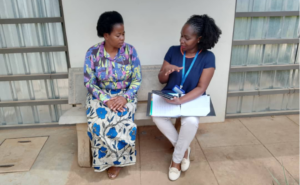Globally, mental health disorders rank as the greatest cause of disability and a leading contributor to the burden of disease. While the U.S. may struggle to meet the need for quality mental healthcare, treatment in most low- and middle-income (LMIC) countries – where 80% of those with mental illness live – is extremely limited. The World Health Organization estimates that over 75% of those needing mental health treatment in LMICs receive no treatment at all. Malawi exemplifies this mental health treatment gap: the country of 20 million has only four psychiatrists and a handful of other mental health professionals.

Researchers with the Division of Global Mental Health and the UNC Institute for Global Health and Infectious Diseases at the UNC School of Medicine, the Gillings School of Global Public Health, and UNC Project-Malawi, in partnership with the Malawi Ministry of Health, Kamuzu University of Health Sciences, and the Malawi Epidemiology and Intervention Research Unit or MEIRU, are rethinking mental healthcare in Malawi to meet the scale and need.
“We know that depression screening, counseling and medication work to treat depression,” explains Brian Pence, Professor of Epidemiology at Gillings and IGHID faculty. “But these tools are not being used, and as a result people continue to suffer from treatable depression, especially in low-resource settings like Malawi. We need to identify the strategies that will allow these proven tools to be integrated into general medical care at scale in resource-limited settings in a way that aligns with local context.”
A new study published in The Lancet-Global Health introduces the results of a five-year trial in Malawi that tested strategies to integrate mental health treatment into general medical care. A companion paper also published in The Lancet-Global Health considers the cost-effectiveness of the implementation strategies evaluated in the study.

Funded by the National Institute of Mental Health, the “Sub-Saharan Africa Regional Partnership for Mental Health Capacity Building” (SHARP) study assessed two implementation strategies to improve the integration of evidence-based depression screening and treatment at 10 district hospitals in Malawi. The evidence-based package included universal depression screening with a standardized tool; the Friendship Bench, which trains community volunteers with no prior medical experience to offer psychosocial counseling; and algorithm-guided antidepressant management for non-specialists, known as measurement-based care.
“This project provides important policy direction for integrating mental health services into general medical care,” says Michael Udedi, assistant director in the Malawi Ministry of Health’s NCDs and Mental Health Division. “This integration is in line with the Ministry’s objectives stated in the current Health Sector Strategic Plan.

Two Implementation Strategies
The first implementation strategy used an internal facility-based champion to spearhead the integration of the screening and treatment package into the hospitals’ general medical care. The second strategy enhanced the champion model by adding quarterly external supervision visits by Ministry and clinical experts who provided audit and feedback to the facility’s leadership on the quality of intervention delivery.
“Implementation science trials are different from typical clinical effectiveness trials,” explains Pence. “Typical clinical trials are trying to prove that a new medical treatment works. In an implementation science trial, we know the treatment works, and what we are testing is whether our strategies help the sites deliver the proven treatment as intended.”
In line with this perspective, the trial’s primary outcomes were whether patients were screened as intended, whether those screening positive started depression treatment as intended, and whether that treatment was continued at follow-up as intended. The trial also looked to see whether patients’ mental health improved.
Altogether, results showed that both implementation strategies succeeded in supporting providers to screen patients and start treatment, but the enhanced strategy with the audit and feedback component led to better follow-up care and improved patient outcomes.
“We know that untreated mental health challenges can be disabling and also fatal,” says Bradley Gaynes, professor of psychiatry at UNC and IGHID faculty member. “Expanding access to quality mental health care is a critical need around the world and is especially acute in Malawi and similar resource-limited countries. SHARP provides a guide on how to effectively deliver this quality care. While other studies have shown that depression treatments can improve outcomes, maintaining this improvement has been challenging. The SHARP project identifies a successful strategy that can help sustain patients on evidence-based treatment and improve recovery from depression for up to 12 months later.”
A Cost-Effectiveness Analysis

Cost-effectiveness analyses are central to implementation science studies. The enhanced audit and feedback strategy led to better service delivery and patient outcomes, but it was more costly to deliver – do the improved outcomes merit the cost? PhD candidate Juan Yanguela at the Department of Health Policy and Management addressed this question by comparing the cost-effectiveness of each of the two implementation strategies to the status quo in Malawi of no depression screening and treatment.
“This comparison can help inform scale-up decisions about the relative benefits of implementing each strategy in facilities that currently offer no depression screening and no treatment,” explained Yanguela. “This is the case in most of Malawi and sub-Saharan Africa.”
The analysis takes the perspective of the Ministry of Health scaling up each strategy to 14 of 28 districts in Malawi, capturing costs for training, project-wide meetings, transportation, medication costs, cost for time associated with internal champion activities and depression screening or treatment, and costs of external supervision visits. Importantly, the costing strategy was designed in conjunction with colleagues at the Malawian Ministry of Health. This helped ensure that the model reflected the costs of the scale-up approach that the Ministry would take outside of the context of a trial.

Relative to the status quo, the basic, champion-based implementation strategy would have an annual cost of $134, 867 to be scaled up to 14 districts. The enhanced strategy would be slightly more expensive at $145,255. However, since the enhanced strategy was more effective, it would cost $119 per depression remission achieved at 3 months, whereas the basic strategy would cost $223 per remission achieved.
When considering implementing a new health strategy, many health systems consider a “willingness to pay” threshold of one to three times the country’s gross domestic product per life year lost to disability that is averted by the strategy. At this threshold, both SHARP strategies would be cost-effective and recommended, with the enhanced strategy being more cost-effective and therefore a promising investment for improving national health. Current Malawian health policy uses a lower willingness to pay threshold of $65 per disability year, meaning that these strategies might not be prioritized relative to other competing demands under current health policy, but could be considered if the Malawian Ministry of Health revises its willingness-to-pay decision-making threshold.
Steve Mphonda, Abigail Morrison, Jonathan Chiwanda and Stephanie Wheeler also contributed to the analysis.
Partnerships Strengthen Mental Health Landscape
The partnership between the Malawi Ministry of Health, Kamuzu University, and UNC on mental health research and service redesign began in 2016 with a focus on addressing depression treatment in HIV care, building on UNC Project-Malawi’s long-term HIV research investments. Since then, the work has steadily expanded into a series of mental health projects that are testing different strategies to make mental health care accessible for everyone, and that is also training a new generation of Malawian mental health researchers.
Gaynes leads WARMHEART, a mental health training program funded through the National Institutes of Health’s Fogarty International Center, with Dr. Kazione Kulisewa, the first Malawian doctor trained as a psychiatrist in decades, also on the SHARP research team. Kulisewa now heads Kamuzu University’s Psychiatry and Mental Health Department, which is training a new generation of psychiatrists.
“The increased investment in the training of psychiatrists will leave a significant footprint on the mental health landscape of Malawi,” says Kulisewa. “Trained specialists will ensure the timely provision of mental health interventions for a population that has a significant mental health treatment gap. Furthermore, the Malawian psychiatrist has a responsibility to lead efforts to destigmatize mental illness through research, community engagement and advocacy for policy changes and increased funding. Our experiences from SHARP suggest another crucial role for the Malawian psychiatrist is to lead efforts in mental health integration by imparting their knowledge and skills to primary health workers through task-shifting strategies.”
Next to Launch
The team is currently launching a five-year study known as ALIGN, a new cluster-randomized implementation science trial that will build on SHARP by adding a district health leadership alignment strategy try to further close the gap in quality mental health care in 12 Malawian districts. ALIGN marks the team’s eighth federally funded mental health grant in Malawi.
